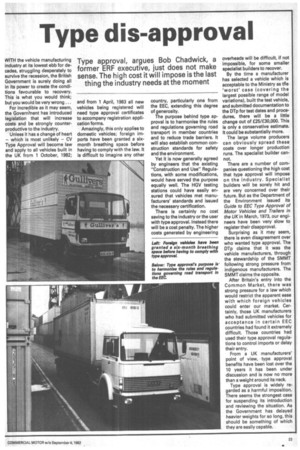Type dis-approval
Page 17

If you've noticed an error in this article please click here to report it so we can fix it.
Type approval, argues Bob Chadwick, a former ERF executive, just does not make sense. The high cost it will impose is the last thing the industry needs at the moment
WITH the vehicle manufacturing industry at its lowest ebb for decades, struggling desperately to survive the recession, the British Government is surely doing all in its power to create the conditions favourable to recovery. This is what you would think; but you would be very wrong ...
For incredible as it may seem, the Governhient has introduced legislation that will increase costs and be strongly counterproductive to the industry.
Unless it has a change of heart — which is most unlikely — CV Type Approval will become law and apply to all vehicles built in the UK from 1 October, 1982; and from 1 April, 1983 all new vehicles being registered will need type approval certificates to accompany registration application forms.
Amazingly, this only applies to domestic vehicles; foreign imports have been granted a sixmonth breathing space before having to comply with the law. It is difficult to imagine any other country, particularly one from the EEC, extending this degree of generosity.
The purpose behind type approval is to harmonise the rules and regulations governing road transport in member countries and to reduce trade barriers. It will also establish common construction standards for safety and the environment.
Yet it is now generally agreed by engineers that the existing "Construction and Use" Regulations, with some modifications, would have served the purpose equally well. The HGV testing stations could have easily ensured that vehicles met manufacturers' standards and issued the necessary certification.
There is certainly no cost saving to the industry or the user with type approval. Instead there will be a cost penalty. The higher costs generated by engineering overheads will be difficult, if not impossible, for some smaller specialist builders to recover.
By the time a manufacturer has selected a vehicle which is acceptable to the Ministry as Vie 'worst' case {covering the largest possible range of model variations), built the test vehicle, and submitted documentation to the DTp for test dates and procedures, there will be a little change out of f25/£30,000. This is only a conservative estimate. It could be substantially more.
The large volume producers can obviously spread these costs over longer production runs. The specialist builder cannot.
There are a number of companies questioning the high cost that type approval will impose on the industry. Specialist builders will be sorely hit and are very concerned over their future. But as the Department of the Environment issued its Guide to EEC Type Approval of Motor Vehicles and Trailers in the UK in March, 1973, our engineers have been very slow to register their disapproval.
Surprising as it may seem, there is even disagreement over who wanted type approval. The DTp claims that it was the vehicle manufacturers, through the stewardship of the SMMT following strong pressure from indigenous manufacturers. The SMMT claims the opposite.
After Britain's entry into the Common Market, there was strong pressure for a law which would restrict the apparent ease with which foreign vehicles could enter our market. Certainly, those UK manufacturers who had submitted vehicles for acceptance in certain EEC countries had found it extremely difficult. Those countries had used their type approval regulations to control imports or delay their entry.
From a UK manufacturers' point of view, type approval benefits have been lost over the 10 years it has been under discussion and is now no more than a weight around its neck.
Type approval is widely regarded as a harmful imposition. There seems the strongest case for suspending its introduction and reviewing the situation. As the Government has delayed heavier weights for so long, this should be something of which they are easily capable.




















































